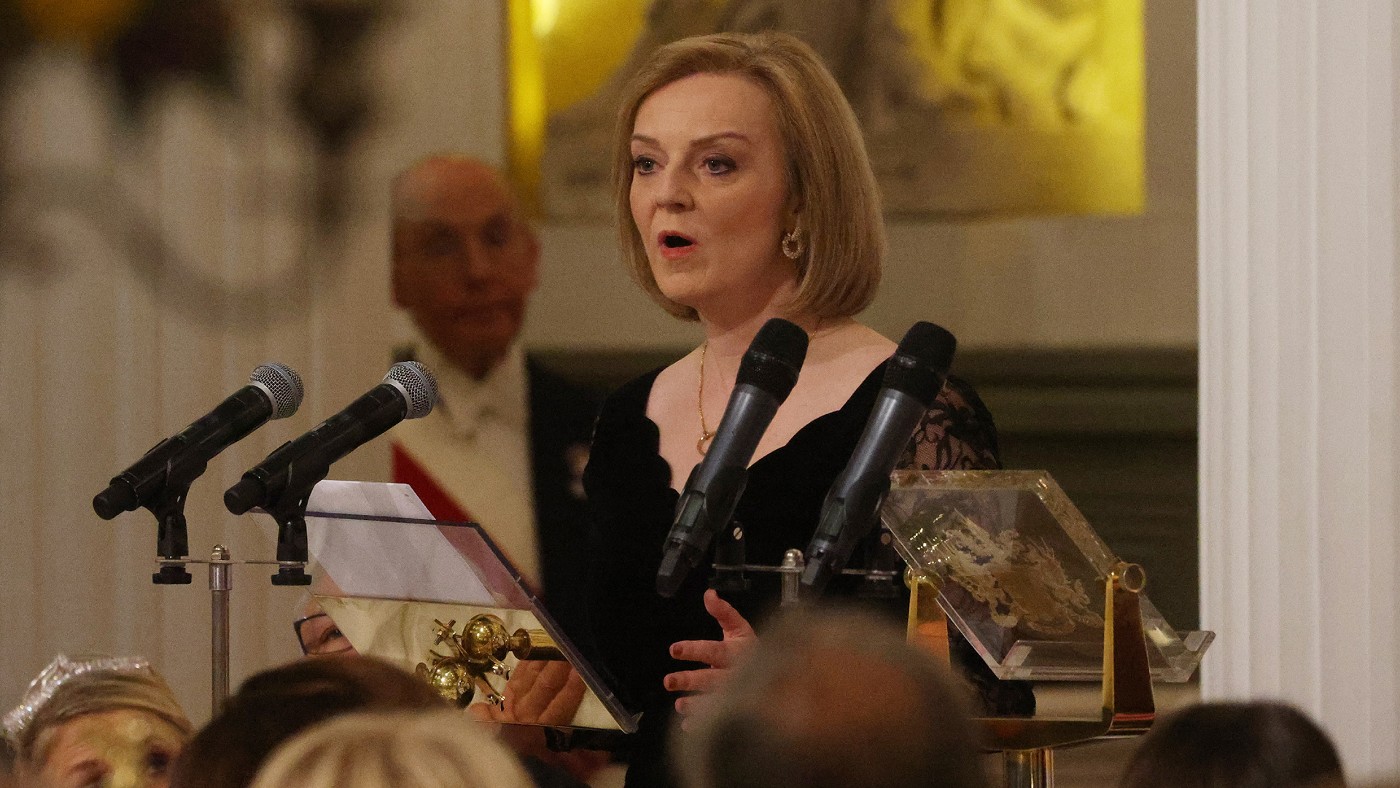Liz Truss lays out Britain’s aims for Ukraine war
Foreign secretary reportedly fears that the conflict could continue for up to ten years

A free daily email with the biggest news stories of the day – and the best features from TheWeek.com
You are now subscribed
Your newsletter sign-up was successful
The UK and its Western allies must “double down” to push Russian forces out of “the whole of Ukraine” and secure a victory that is a “strategic imperative for all of us”, Foreign Secretary Liz Truss has declared.
In a keynote speech at Mansion House in London last night, Truss warned that Vladimir Putin was a “rogue operator” who might invade other countries including Georgia and Moldova unless the West hit back hard to defend Ukraine.
“Heavy weapons, tanks, airplanes – digging deep into our inventories, ramping up production. We need to do all of this,” she said, adding that this is “a time for courage, not caution”.
The Week
Escape your echo chamber. Get the facts behind the news, plus analysis from multiple perspectives.

Sign up for The Week's Free Newsletters
From our morning news briefing to a weekly Good News Newsletter, get the best of The Week delivered directly to your inbox.
From our morning news briefing to a weekly Good News Newsletter, get the best of The Week delivered directly to your inbox.
If Putin succeeded in making territorial gains, he could inflict “untold further misery across Europe”, warned Truss, who called for further military and economic support for countries threatened by potential Russian aggression.
The West must also continue to send food, medicine and other essentials to Ukraine to keep the eastern European nation’s economy afloat, she said. And defence budgets must be increased across the Western world.
The Nato target of spending 2% of GDP on defence “must be a floor, not a ceiling”, Truss insisted.
According to The Times, the foreign secretary “is understood to believe that the war could realistically last up to five years, or even as long as a decade”.
A free daily email with the biggest news stories of the day – and the best features from TheWeek.com
She described modern-day Russia as even less trustworthy than the USSR, whose leaders at least “behaved with some kind of rationality on the world stage”.
“They would de-escalate when they were confronted and called out, as with the Cuban Missile Crisis 60 years ago,” she said. “And they had an eye on their global reputation. None of these factors applies to Putin.”
She “also singled out” China, for refusing to condemn the Ukraine invasion, The Independent reported.
But China “will not continue to rise” if Beijing does “not play by the rules”, she warned. “China needs trade with the G7. We represent around half of the global economy. And we have choices.”
Chas Newkey-Burden has been part of The Week Digital team for more than a decade and a journalist for 25 years, starting out on the irreverent football weekly 90 Minutes, before moving to lifestyle magazines Loaded and Attitude. He was a columnist for The Big Issue and landed a world exclusive with David Beckham that became the weekly magazine’s bestselling issue. He now writes regularly for The Guardian, The Telegraph, The Independent, Metro, FourFourTwo and the i new site. He is also the author of a number of non-fiction books.
-
 Secured vs. unsecured loans: how do they differ and which is better?
Secured vs. unsecured loans: how do they differ and which is better?the explainer They are distinguished by the level of risk and the inclusion of collateral
-
 ‘States that set ambitious climate targets are already feeling the tension’
‘States that set ambitious climate targets are already feeling the tension’Instant Opinion Opinion, comment and editorials of the day
-
 Mixing up mixology: The year ahead in cocktail and bar trends
Mixing up mixology: The year ahead in cocktail and bar trendsthe week recommends It’s hojicha vs. matcha, plus a whole lot more
-
 Should the EU and UK join Trump’s board of peace?
Should the EU and UK join Trump’s board of peace?Today's Big Question After rushing to praise the initiative European leaders are now alarmed
-
 Witkoff and Kushner tackle Ukraine, Iran in Geneva
Witkoff and Kushner tackle Ukraine, Iran in GenevaSpeed Read Steve Witkoff and Jared Kushner held negotiations aimed at securing a nuclear deal with Iran and an end to Russia’s war in Ukraine
-
 ‘The forces he united still shape the Democratic Party’
‘The forces he united still shape the Democratic Party’Instant Opinion Opinion, comment and editorials of the day
-
 How corrupt is the UK?
How corrupt is the UK?The Explainer Decline in standards ‘risks becoming a defining feature of our political culture’ as Britain falls to lowest ever score on global index
-
 ‘The mark’s significance is psychological, if that’
‘The mark’s significance is psychological, if that’Instant Opinion Opinion, comment and editorials of the day
-
 Trump’s ‘Board of Peace’ comes into confounding focus
Trump’s ‘Board of Peace’ comes into confounding focusIn the Spotlight What began as a plan to redevelop the Gaza Strip is quickly emerging as a new lever of global power for a president intent on upending the standing world order
-
 The high street: Britain’s next political battleground?
The high street: Britain’s next political battleground?In the Spotlight Mass closure of shops and influx of organised crime are fuelling voter anger, and offer an opening for Reform UK
-
 Trump considers giving Ukraine a security guarantee
Trump considers giving Ukraine a security guaranteeTalking Points Zelenskyy says it is a requirement for peace. Will Putin go along?